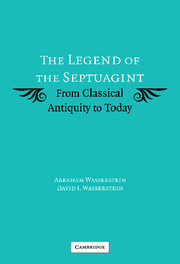Book contents
- Frontmatter
- Contents
- Preface and Acknowledgments
- Abbreviations
- Introduction
- 1 The Letter of Aristeas
- 2 The Hellenistic Jewish Tradition
- 3 The Rabbis and the Greek Bible
- 4 The Ptolemaic Changes
- 5 The Church Fathers and the Translation of the Septuagint
- 6 Among the Christians in the Orient
- 7 The Muslims and the Septuagint
- 8 Yosippon and the Story of the Seventy
- 9 Karaites, Samaritans and Rabbanite Jews in the Middle Ages
- 10 The Septuagint in the Renaissance and the Modern World
- Conclusion
- Appendix: In Partibus Infidelium: Zosimus of Panopolis
- Bibliography and Sources
- Index
1 - The Letter of Aristeas
Published online by Cambridge University Press: 17 July 2009
- Frontmatter
- Contents
- Preface and Acknowledgments
- Abbreviations
- Introduction
- 1 The Letter of Aristeas
- 2 The Hellenistic Jewish Tradition
- 3 The Rabbis and the Greek Bible
- 4 The Ptolemaic Changes
- 5 The Church Fathers and the Translation of the Septuagint
- 6 Among the Christians in the Orient
- 7 The Muslims and the Septuagint
- 8 Yosippon and the Story of the Seventy
- 9 Karaites, Samaritans and Rabbanite Jews in the Middle Ages
- 10 The Septuagint in the Renaissance and the Modern World
- Conclusion
- Appendix: In Partibus Infidelium: Zosimus of Panopolis
- Bibliography and Sources
- Index
Summary
The Letter of Aristeas is a curious and paradoxical work. It is best known as what purports to be a contemporary, and thus the earliest extant, account of the translation of Scripture into Greek. It is important not least because, with the exception of the Septuagint itself, it is the longest of the extant products of Alexandrian Judaism in the Ptolemaic period and because it is the most complete piece of Alexandrian prose surviving in its original dress. Yet its historical significance derives from its function in Christian history rather than in the history of hellenistic literature. It was quite obviously written by a Jew largely for Jewish purposes, but, with the possible exception of one short period, it has played no role in Jewish life. Like all other extant works of hellenistic Jewish literature, including the Septuagint itself, it has survived exclusively in the Christian Church, serving purposes only incidentally related to any that could have been envisaged by its author.
The text of the Letter, of which we have a good number of witnesses, appears exclusively in manuscripts of Octateuch catenae. (Catenae are collections of exegetical quotations from theological and other writers that follow the sequence of the text and are attached to particular verses of the Bible. The Octateuch is the first eight books of the Bible: Genesis to Deuteronomy, together with Joshua, Judges and Ruth. The creation of catenae on the Octateuch has Byzantine origins.)
- Type
- Chapter
- Information
- The Legend of the SeptuagintFrom Classical Antiquity to Today, pp. 19 - 26Publisher: Cambridge University PressPrint publication year: 2006



